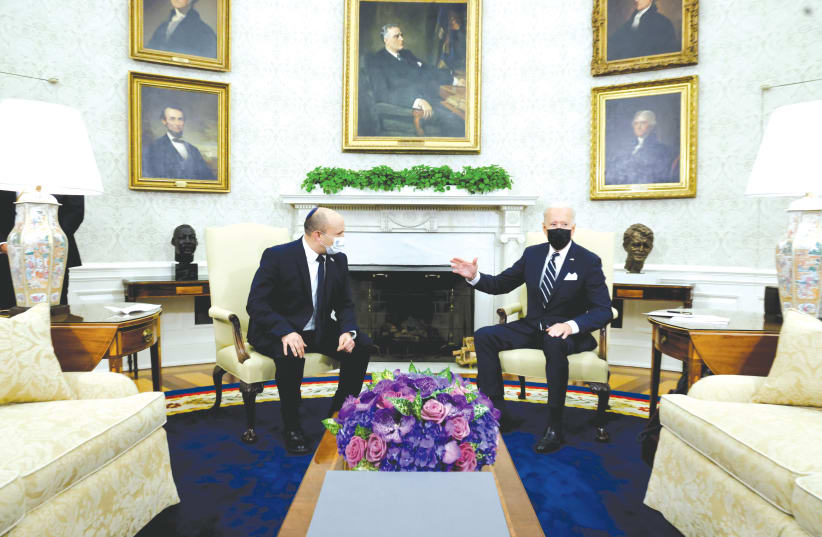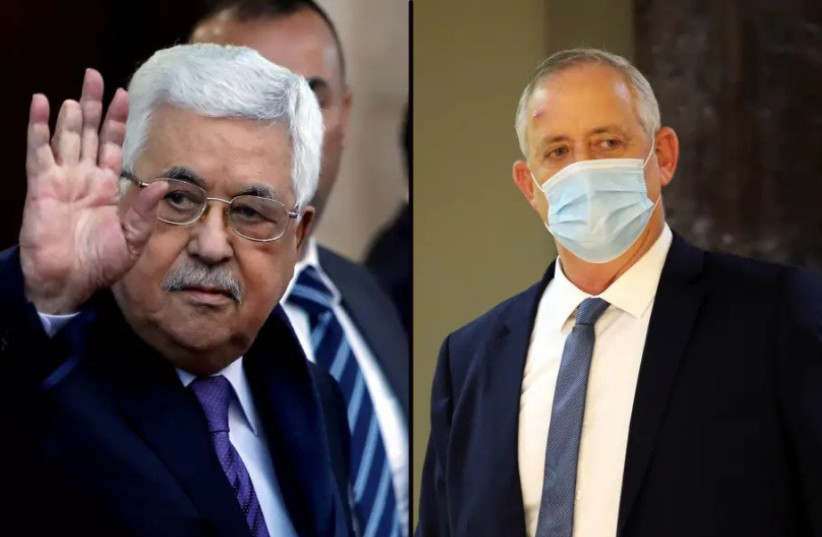Prime Minister Naftali Bennett returned home from Washington after his first meeting with US President Joe Biden at the end of August, confident that he had ticked all the key boxes.
“We had a particularly warm and helpful meeting,” he declared, before flying home. “Biden and I have developed a direct and personal relationship built on trust.”
Pressing restart with the Democratic president following the turbulent relations between former prime minister Benjamin Netanyahu and US presidents Bill Clinton and Barack Obama was the name of the game and, despite important differences on key issues, officials in the prime minister’s entourage were more than satisfied with the outcome, which followed weeks of meticulous planning.
“It was an excellent meeting, especially the one-on-one. It was largely a working meeting. There was a feeling that we’ve known each other for a long time. I found a leader who loves Israel, knows exactly what he wants and is attentive to our needs,” Bennett said.
The bottom line is this: the Biden administration wants to do everything possible to prevent the return of Netanyahu to power. They are acutely aware of the fragile nature of the wafer-thin Bennett coalition, which needs the support of all its disparate elements to survive. Therefore, they will not do anything that may provoke a political crisis and force a new election that could result in a Likud return to power.
A case in point is the question of the reopening of the US consulate in Jerusalem – the de facto US embassy for Palestinians.
The mission was closed down by then-US president Donald Trump in 2019 after he moved the American embassy from Tel Aviv to Jerusalem and recognized Israeli sovereignty over the entire city.
The Biden administration wants to reopen the mission but Bennett, along with the other right-wing elements in the government, oppose such a move, arguing it would undermine Israeli sovereignty over its capital city. So, although Biden raised the consulate question during the White House talks, the issue will be put on the back burner and it is unlikely that there will be any concrete steps toward reopening the mission in the foreseeable future.
The White House meeting almost didn’t happen. With journalists already in place waiting for the arrival of the two leaders, initial reports came through of a large bombing outside Kabul’s airport, where thousands of desperate Afghans were gathered trying to leave on the last flights in the final days before American troops were scheduled to leave the country on August 31. As the full extent of the horror became apparent it was clear that this incident was a watershed moment for the Biden presidency. The president delayed the meeting by a day, forcing Bennett and his entourage to spend Shabbat in the US.
The meeting finally took place a few hours before the start of Shabbat in Israel, meaning no primetime TV coverage. On the positive side, due to the unfolding events in Kabul, world media coverage of the Biden-Bennett meeting was unprecedented and Biden appreciated the gesture by the Israeli leader to delay his departure to accommodate the revised timetable.
Following the meeting, in a short joint statement to the press, Biden said that he and Bennett had become “close friends” since the premier’s arrival in Washington.
“He heads and leads the most diverse government in Israeli history,” Biden said while addressing the prime minister.
Regarding Iran, the president told reporters that Tehran will “never” obtain an atomic bomb.
Iran was top of the agenda and Bennett said that he had reached important agreements with Biden. “We agreed to joint strategic work to block the Iranian race for nuclear weapons with the Americans. We took a significant step in equipping and building Israeli power.”
According to a diplomatic source in the prime minister’s entourage, Israel presented two objectives as part of Bennett’s strategic plan for Iran: pushing Tehran back into a corner and putting an end to its ability to achieve nuclear breakout capability.
The prime minister was pleased with the president’s clear pledge that Iran would not acquire nuclear weapons – not just on his watch, but ever. Furthermore, the Israeli team also received a presidential pledge to recognize that if diplomacy ultimately fails to achieve that goal, it could also be achieved by means of “other options.”
With the US administration winding down its military presence across the Middle East it may be that this commitment remains declaratory but, as far as Israel is concerned, it still represented a diplomatic achievement, and it was certainly enough to anger the Iranians.
A top Iranian security official accused Biden of illegally threatening Tehran.
“The emphasis on using ‘other options’ against Iran amounts to threatening another country illegally and establishes Iran’s right to reciprocate... against ‘available options,’” said Ali Shamkhani, secretary of Iran’s Supreme National Security Council.
Despite the talk of “other options,” Washington remains committed to reviving the Joint Comprehensive Plan of Action nuclear deal signed between Iran and the world powers, although it remains unclear if Iran is prepared to return to the deal without major concessions in return.
BENNETT ALSO chalked up two more achievements.
First, Biden pledged one billion dollars to replenish Iron Dome air defense interceptor missiles. And there was also progress on the question of adding Israel to the US Visa Waiver Program, which is an issue that could benefit tens of thousands of Israeli travelers every year. “For the first time, Biden instructed to move forward and close the deal as quickly as possible,” said Bennett. Even though the issue has been discussed for decades, it appears there is now a willingness from the current administration to waive the visa requirement, albeit without a date at this juncture for such a move.
The president also raised the issue of Israel’s ties with China. The US wants tighter restrictions on Israel’s technological cooperation with Beijing and is wary of some of the infrastructure projects that are under construction in Israel together with Chinese companies.
As part of the preparatory discussions ahead of the Washington talks it was made clear that there could be no diplomatic progress on the Palestinian front as long as Bennett was prime minister. In an interview with The New York Times published prior to his departure for Washington, the prime minister promised not to annex territory in the West Bank, but also said his government will not establish a Palestinian state.
A statement issued by the White House after the meeting said that Biden “reaffirmed his view that a negotiated two-state solution is the only viable path to achieving a lasting resolution to the Israeli-Palestinian conflict.” He urged Israel to take “steps to improve the lives of Palestinians and support greater economic opportunities for them.”
TWO DAYS after the White House talks, Israel agreed to a number of confidence-building measures to ease the plight of West Bank Palestinians in the first meeting in more than a decade between Palestinian Authority President Mahmoud Abbas and a senior Israeli minister.
However, Bennett was quick to stress that the talks between Defense Minister Benny Gantz and Abbas in Ramallah did not herald the end of the diplomatic deadlock.
“There is no diplomatic process with the Palestinians, nor will there be one,” said a source close to Bennett, stressing that the discussions focused on security cooperation.
Gantz said Israel had agreed to grant residency rights to thousands of West Bank Palestinians with no legal status – mostly Palestinians from Gaza or foreigners married to Palestinians – and will advance to the PA NIS 500 million in taxes Israel collects on the PA’s behalf.
Israel will also issue permits for an additional 15,000 Palestinians to work inside Israel.
Gantz briefed military affairs correspondents after the meeting, reporting that the atmosphere had been good. “I told him that neither we nor the Palestinians were going anywhere tomorrow morning,” said Gantz. “I came to the meeting to build trust and to protect the State of Israel’s interests and our important ties with the Palestinian Authority, which I believe needs to be strengthened.”
Gantz went on to say, “The stronger the Palestinian Authority is, the weaker Hamas will be, and the more governance [i.e. control] it has, the more security there will be, and the less we will have to operate.”
The meeting was condemned by right-wing politicians from the coalition and the opposition.
“In his place, I wouldn’t have held the meeting because Abbas pays salaries to the families of terrorists,” said Justice Minister Gideon Sa’ar, head of the New Hope Party.
Otzma Yehudit chairman Itamar Ben-Gvir said pressure from Biden has begun to yield results and he accused Gantz of holding “negotiations with a terrorist.”
Despite the goodwill gestures, a spokesperson for Hamas denounced the meeting as a “stab in the back of the Palestinian people and their sacrifices.”
Having cleared his first major diplomatic hurdle, there was little respite for the prime minister who returned home to tackle the ongoing coronavirus crisis, the tension on the Gaza border and the efforts to pass the budget by November.
For now “the most diverse government in Israeli history” – to use Biden’s phrase – remains intact, but Bennett knows that keeping the coalition together remains his number one priority.

